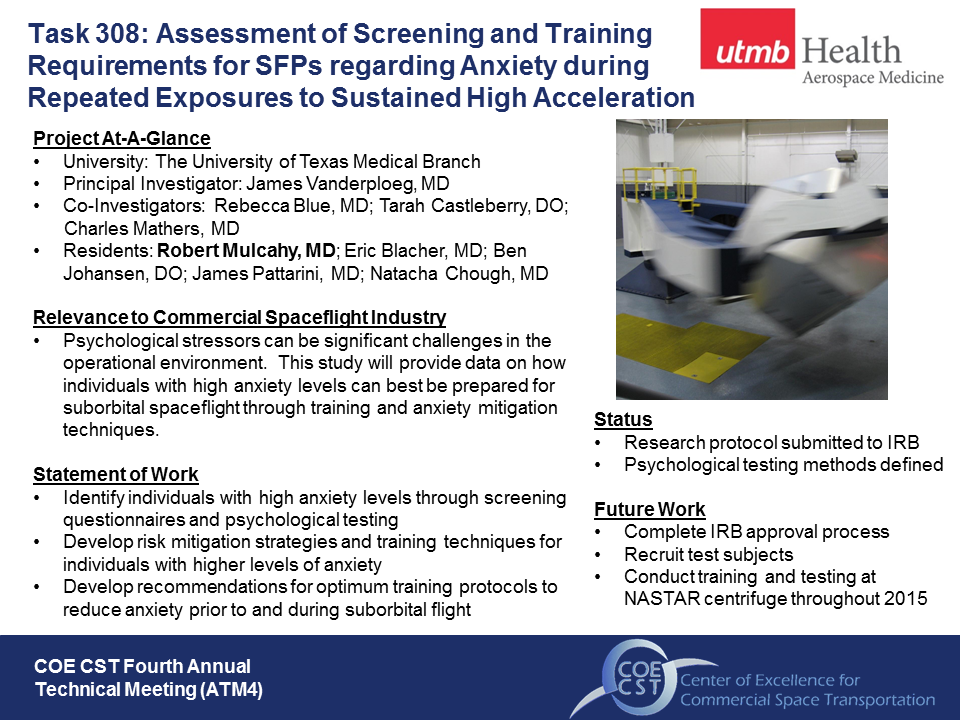308. Suborbital SFP Anxiety Assessment
Team
| Name | Role | Primary |
| James Vanderploeg | Principal Investigator | ● |
| Tarah Castleberry | Principal Investigator | |
| Henry Lampazzi | Tech Monitor | ● |
| Glenita Segura | Fiscal Admin | ● |
| Jim Vanderploeg | Fiscal Admin | ● |
| Ramona Carpenter | Fiscal Admin | |
| Mike Clark | Fiscal Admin | |
| Tara McElroy | Fiscal Admin | |
| Sharon Nguyen | Fiscal Admin |
Project Description
Anxiety and psychological concerns may pose a challenge to future commercial spaceflight. Most of the psychological knowledge regarding humans in spaceflight is based upon studies of career astronauts selected under stringent medical and psychological standards. While there has been limited study regarding chronic medical conditions and commercial spaceflight participant tolerance of space vehicle acceleration profiles, there has been almost no investigation into anxiety and psychological elements related to commercial spaceflight. This is of concern, as spaceflight participants are not likely to participate in a prolonged training program prior to launch, leaving them potentially unprepared for the psychological stressors of flight. At the same time, there is currently little known regarding effective screening methods to identify those at the highest risk of experiencing psychological difficulty with the operational environment of spaceflight. This study proposes to utilize spaceflight simulations in a centrifuge to conduct training and evaluation of future spaceflight participants or laypersons that meet the same demographic pool in order to develop more effective psychological screening techniques, training modalities, and interventions to identify, treat, and mitigate anxiety or other psychological challenges that will be encountered during commercial space operations.
Project Outcomes
(1) a literature review evaluating prior studies in anxiety mitigation, operational impact, and training techniques that may provide insight to current concerns and efforts;
(2) a final report that will be completed at the end of the study outlining findings, techniques, and potential strategies, and
(3) the findings will also be submitted for presentation at an annual scientific meeting of the Aerospace Medical Association (AsMA). The final report may also be prepared
for submission for publication in Aerospace Medicine and Human Performance – the journal of AsMA.
Summary of Output
Anxiety and psychological concerns may pose a challenge to future commercial spaceflight. Most of the psychological knowledge regarding humans in spaceflight is based upon studies of career astronauts selected under stringent medical and psychological standards. While there has been limited study regarding chronic medical conditions and commercial spaceflight participant tolerance of space vehicle acceleration profiles, there has been almost no investigation into anxiety and psychological elements related to commercial spaceflight. This is of concern, as spaceflight participants are not likely to participate in a prolonged training program prior to launch, leaving them potentially unprepared for the psychological stressors of flight. At the same time, there is currently little known regarding effective screening methods to identify those at the highest risk of experiencing psychological difficulty with the operational environment of spaceflight. This study proposes to utilize spaceflight simulations in a centrifuge to conduct training and evaluation of future spaceflight participants or laypersons that meet the same demographic pool in order to develop more effective psychological screening techniques, training modalities, and interventions to identify, treat, and mitigate anxiety or other psychological challenges that will be encountered during commercial space operations.
Quad Chart
